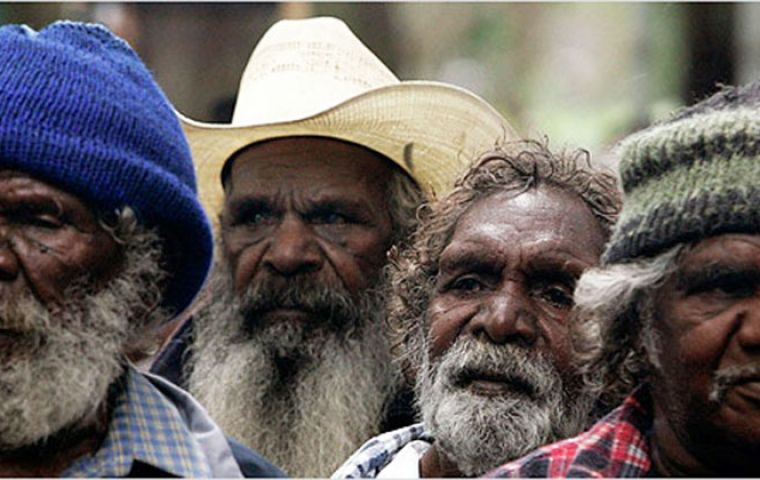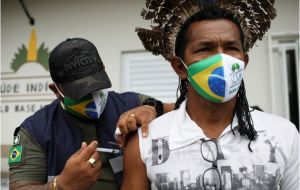MercoPress. South Atlantic News Agency
International Day of the World’s Indigenous Peoples: time to uphold and enforce rights
 In Australia, Aboriginal people are 3% of the population but 29% of the prison population. (Pic Reuters)
In Australia, Aboriginal people are 3% of the population but 29% of the prison population. (Pic Reuters)  In Canada, indigenous women are 12 times more likely to experience gender-based violence and seven times more likely to be killed than other groups
In Canada, indigenous women are 12 times more likely to experience gender-based violence and seven times more likely to be killed than other groups  Indigenous people are disadvantaged by a vaccine hierarchy, such as in Brazil, where only inhabitants of ‘legally demarcated’ territories are considered eligible.
Indigenous people are disadvantaged by a vaccine hierarchy, such as in Brazil, where only inhabitants of ‘legally demarcated’ territories are considered eligible.  For trade unions, the fight for the rights of working people must include the rights of indigenous people. Only 24 states have ratified ILO Convention 169
For trade unions, the fight for the rights of working people must include the rights of indigenous people. Only 24 states have ratified ILO Convention 169 The International Trade Union Confederation (ITUC) (*) is celebrating the cultural and linguistic richness of indigenous populations. We recognize their knowledge of the natural world that can provide leadership and guidance to preserve ecosystems in the face of the environmental climate crisis.
For too long indigenous people have been routinely oppressed and marginalized in intersecting ways. A legacy of centuries of systematic subjugation, disregard of culture and abuse of their lands by colonial and neo-colonial powers.
Across the world indigenous groups are refused the right to self-governance or access to land they have been a part of for countless generations. From Paraguay to Palestine, they have been dispossessed by corporate expansionism or imperialist states. Many of the world’s 476 million indigenous people, forced into statelessness, are robbed of the right to decent health care and employment protections.
Many are displaced as their land, and the income they could earn from it, is stolen or poisoned such as in South America’s Amazon. Extraction and pollution of these territories is a threat to us all as it contributes to climate change and ecological breakdown.
Indigenous peoples face extreme forms of exploitation. In Guatemala, Cameroon and Nepal discriminatory laws and practices trap them in debt bondage or slave-like labor conditions. Even when state and institutional protection is available, their homes are frequently far removed from these resources.
A consistent failure to uphold the rights of indigenous people and include them in policy and decision-making leads to institutional stigmatization and dehumanization.
In Australia, Aboriginal people are 3% of the population but 29% of the prison population. In Canada, indigenous women are 12 times more likely to experience gender-based violence and seven times more likely to be killed than other groups of women. For decades, Canada practiced a cruel assimilation regime that stole indigenous children from their families and placed them in homes where they were abused and killed with many still missing.
Indigenous leaders in countries like the Philippines, Honduras, Chile, Peru, Brazil, Guatemala and Colombia are the victims of arbitrary arrest, forced disappearance, death threats and murder.
Research suggests that higher rates of indigenous peoples live with disabilities alongside multiple other forms of discrimination. Some also feel excluded from the global north’s predominant discourse and concepts of disability.
COVID-19 has exposed many pre-existing inequalities and systems of oppression within our societies. Native Americans are dying from the virus at far higher rates than other demographic groups. This is linked to centuries’ old structural inequalities, with indigenous populations more likely to inhabit over-crowded accommodation or have less access to good sanitation and affordable healthcare.
Elsewhere, indigenous people are disadvantaged by a vaccine hierarchy, such as in Brazil, where only inhabitants of ‘legally demarcated’ territories are considered eligible.
For trade unions, the fight for the rights of working people must include the rights of indigenous people. Only 24 states having ratified ILO Convention 169 (Indigenous and Tribal Peoples), with poor implementation by those who have. Trade unions must campaign for widespread ratification and effective implementation.
Convention 169 has shortcomings, but its successful ratification and enforcement in tandem with Convention 105 (Forced Labour) and C190 (Violence & Harassment in the World of Work) should be part of a New Social Contract that builds an inclusive, socially just and resilient future for all - a future of due diligence for human rights, universal social protection, and investments in quality public services for all citizens.
This International Day of the World’s Indigenous Peoples the ITUC stands alongside indigenous people, trade unions, working people, activists and movements fighting for indigenous rights and inclusion.
(*) International Trade Union Confederation (ITUC) represents 200 million members of 332 affiliates in 163 countries and territories




Top Comments
Disclaimer & comment rulesCommenting for this story is now closed.
If you have a Facebook account, become a fan and comment on our Facebook Page!